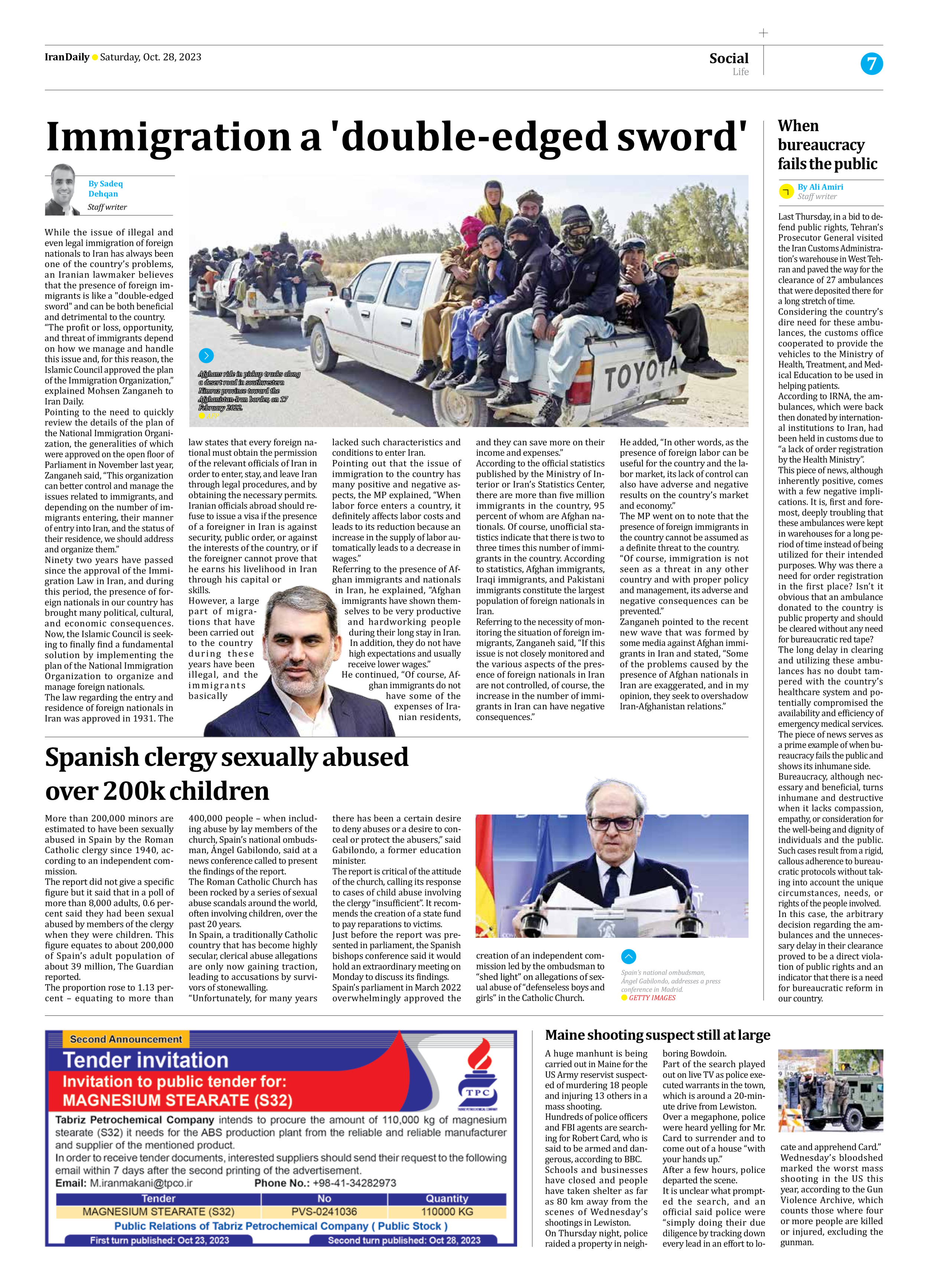
Immigration a ’double-edged sword’
By Sadeq Dehqan
Staff writer
While the issue of illegal and even legal immigration of foreign nationals to Iran has always been one of the country’s problems, an Iranian lawmaker believes that the presence of foreign immigrants is like a "double-edged sword" and can be both beneficial and detrimental to the country.
“The profit or loss, opportunity, and threat of immigrants depend on how we manage and handle this issue and, for this reason, the Islamic Council approved the plan of the Immigration Organization,” explained Mohsen Zanganeh to Iran Daily.
Pointing to the need to quickly review the details of the plan of the National Immigration Organization, the generalities of which were approved on the open floor of Parliament in November last year, Zanganeh said, “This organization can better control and manage the issues related to immigrants, and depending on the number of immigrants entering, their manner of entry into Iran, and the status of their residence, we should address and organize them.”
Ninety two years have passed since the approval of the Immigration Law in Iran, and during this period, the presence of foreign nationals in our country has brought many political, cultural, and economic consequences. Now, the Islamic Council is seeking to finally find a fundamental solution by implementing the plan of the National Immigration Organization to organize and manage foreign nationals.
The law regarding the entry and residence of foreign nationals in Iran was approved in 1931. The law states that every foreign national must obtain the permission of the relevant officials of Iran in order to enter, stay, and leave Iran through legal procedures, and by obtaining the necessary permits. Iranian officials abroad should refuse to issue a visa if the presence of a foreigner in Iran is against security, public order, or against the interests of the country, or if the foreigner cannot prove that he earns his livelihood in Iran through his capital or skills.
However, a large part of migrations that have been carried out to the country during these years have been illegal, and the immigrants basically lacked such characteristics and conditions to enter Iran.
Pointing out that the issue of immigration to the country has many positive and negative aspects, the MP explained, “When labor force enters a country, it definitely affects labor costs and leads to its reduction because an increase in the supply of labor automatically leads to a decrease in wages.”
Referring to the presence of Afghan immigrants and nationals in Iran, he explained, “Afghan immigrants have shown themselves to be very productive and hardworking people during their long stay in Iran. In addition, they do not have high expectations and usually receive lower wages.”
He continued, “Of course, Afghan immigrants do not have some of the expenses of Iranian residents, and they can save more on their income and expenses.”
According to the official statistics published by the Ministry of Interior or Iran’s Statistics Center, there are more than five million immigrants in the country, 95 percent of whom are Afghan nationals. Of course, unofficial statistics indicate that there is two to three times this number of immigrants in the country. According to statistics, Afghan immigrants, Iraqi immigrants, and Pakistani immigrants constitute the largest population of foreign nationals in Iran.
Referring to the necessity of monitoring the situation of foreign immigrants, Zanganeh said, “If this issue is not closely monitored and the various aspects of the presence of foreign nationals in Iran are not controlled, of course, the increase in the number of immigrants in Iran can have negative consequences.”
He added, “In other words, as the presence of foreign labor can be useful for the country and the labor market, its lack of control can also have adverse and negative results on the country’s market and economy.”
The MP went on to note that the presence of foreign immigrants in the country cannot be assumed as a definite threat to the country.
“Of course, immigration is not seen as a threat in any other country and with proper policy and management, its adverse and negative consequences can be prevented.”
Zanganeh pointed to the recent new wave that was formed by some media against Afghan immigrants in Iran and stated, “Some of the problems caused by the presence of Afghan nationals in Iran are exaggerated, and in my opinion, they seek to overshadow Iran-Afghanistan relations.”







